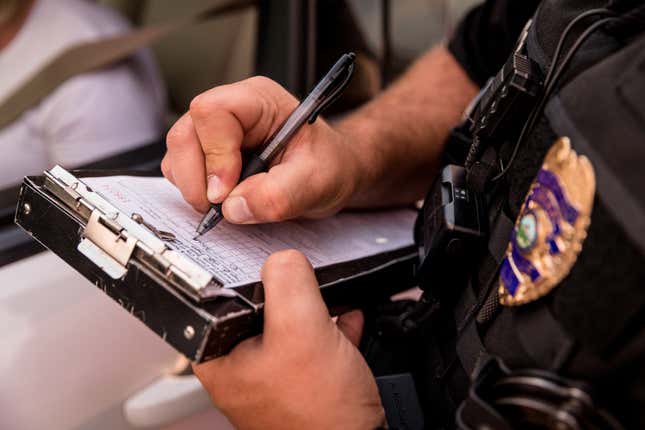
As a black man in America whose survival instincts require me to avoid police at all costs, I’ve heard plenty of horror stories about how a broken taillight or brake light can invite harassment, an introduction to our criminal justice system, or worse.
Thankfully, police officers in Minneapolis have come to their senses—presumably—and will now issue vouchers instead of citations for vehicle equipment violations.
From the Minnesota Star Tribune:
Under the new policy, instead of writing a ticket, officers will now have the option of issuing drivers a voucher from the Lights On! program—financed by the nonprofit group MicroGrants, which partners with local organizations to promote economic self-sufficiency among lower income residents, according to its website. The vouchers can be redeemed at participating auto shops to cover the costs of services such as replacing a bulb from a rear taillight. Exceptions include cases in which equipment violations result in a crash or “harm to another,” according to the new guidelines. Motorists with outstanding warrants or who have committed some other criminal act can still be arrested after being pulled over.
This revamped policy is viewed as a mechanism to address the racial and class disparities that persist in traffic stops and became a point of contention during an intense debate on the matter last year at City Hall.
“Fixing minor issues such as a broken brake light can go a long way toward breaking the cycle of poverty,” the Minneapolis Police Department said in a statement. “Individuals who ignore a fix-it ticket are at risk of having their license suspended.”
In response to the new policy, civil rights attorney Nekima Levy Armstrong believes it’s a step in the right direction toward “reversing age-old racial disparities between black and white motorists.”
“Ultimately, we want police officers to be problem solvers,” she said. “Not gateways into the justice system for poor people of color.”
The new policy isn’t without its detractors, however, as some believe it doesn’t do anywhere near enough to protect the safety of citizens.
“How does that reduce the racial disparities in the stops to begin with, and I don’t see that this policy change does that,” Pete Gamades, a community organizer, said. “One of our goals was to eliminate the stops completely, and potentially mail a coupon to the owner of the car, and hence remove that interaction with the cop that could not end well for either side.”
With many residents struggling to make ends meet, the Star Tribune notes that something as seemingly minute as a broken taillight can “harm their economic well-being” and send them spiraling “deeper into the criminal justice system” unfairly.
There’s also this bit of unsettling news:
A 2018 Hennepin County Public Defender’s Office report found that more than half of motorists stopped citywide for equipment violations were black, even though blacks make up only about a fifth of the city’s population. The disparity was particularly glaring in the ethnically diverse neighborhoods of north Minneapolis, where the study found that 80% of drivers pulled over were black, compared with 12% who were white.
None of this is even remotely surprising, but anything that may potentially help reduce the likelihood of negative police interactions with communities of color is a step in the right direction.
It’s just painfully clear that the MPD has much more work to do.

